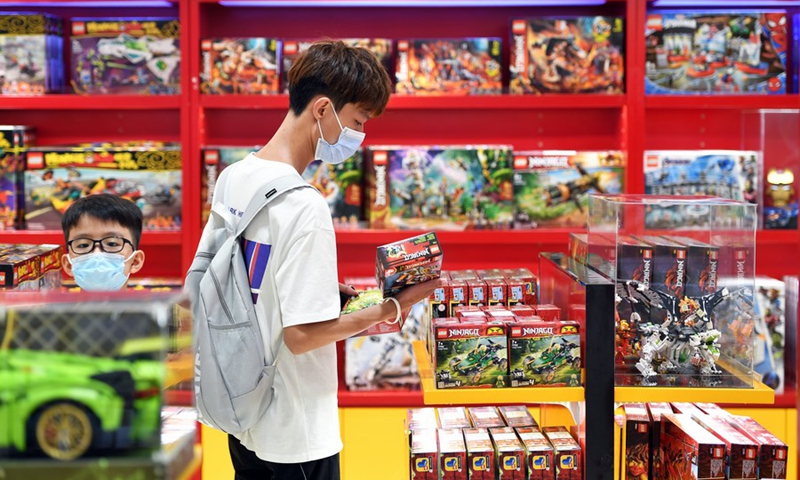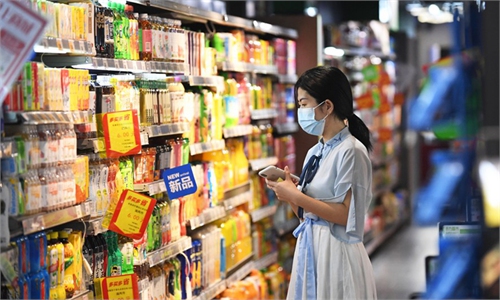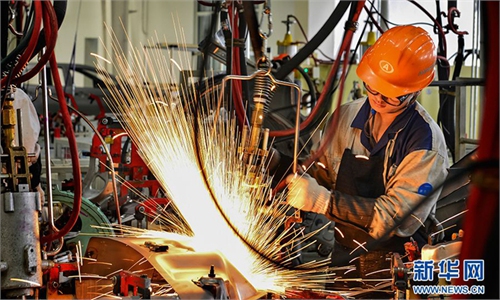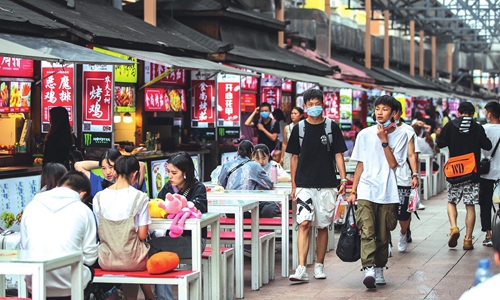China’s consumption slowdown signals challenges, but recovery to continue
Uncertainty remains, but stable recovery to continue

Customers choose products at a duty-free shopping mall in Haikou, south China's Hainan Province. File Photo: Xinhua
The growth of China's retail sales, a key economic indicator, slowed down significantly in August as the latest coronavirus flare-up and extreme weather conditions constrained consumption during the summer vacation, according to official data on Wednesday, underscoring lingering challenges and uncertainties for the country's economic recovery.
While uncertain factors remain given the latest COVID-19 outbreaks in East China's Fujian Province, favorable conditions will help sustain stable consumption growth as well as economic recovery for the rest of the year, Chinese officials and analysts noted.
The country's retail sales stood at 3.44 trillion yuan ($534 billion) in August, increasing 2.5 percent year-on-year, down 6 percentage points from the 8.5 percent growth in July, data from the National Bureau of Statistics (NBS) showed on Wednesday.
NBS spokesperson Fu Linghui said at a press briefing on Wednesday that new COVID-19 case spikes and flooding in parts of the country affected travel, and dragged down consumption during summer holidays.
Fu also attributed the slowdown in consumption to a higher comparison base in the previous month. In August 2020, the country's retail sales grew 0.5 percent year-on-year - expansion for the first-time since last year.
The unexpected ease in retail sales growth underscored that consumption is "the biggest weakness" of China's economic recovery from the COVID-19, Wang Jun, a member of the academic committee at the China Center for International Economic Exchanges and chief economist with Zhongyuan Bank, told the Global Times on Wednesday.
Due to sporadic case spikes in regions including South China's Guangdong, East China's Jiangsu Province as well as the latest outbreak in Fujian, the recovery of China's consumption sector, especially across services, has been below market expectations since the beginning of 2021.
To boost domestic consumption under the "dual circulation" strategy, the Chinese government has launched a series of sales promotion events , ranging from a month-long national shopping festival in May, to first China International Consumer Products Expo held in Haikou, South China's Hainan Province and the China International Fair for Trade in Services held in Beijing in September.
However, the overall recovering trend in consumption has not changed and the consumption environment will be improved as the broad economic recovery continues and the COVID-19 remains largely under control, Fu noted.
With a population of 1.4 billion, a middle-class population of 400 million and per capita of over $10,000, China has a huge market advantage that will ensure persistent consumption growth and consumption upgrade, the spokesperson added.
Meanwhile, the country's stable employment, guaranteed resident income increase and comparatively fast-growing corporate profit will jointly lead to stronger consumption capacity.
NBS data showed that the country added 9.38 million new jobs in the first eight months of the year, achieving 85.3 percent of the official target for the year. In August, the country's unemployment rate remained unchanged at 5.1 percent.
Looking ahead to the rest of the year, Cong Yi, a professor at the Tianjin University of Finance and Economics, told the Global Times that China's total retail sales is expected to see "remarkable growth" quarter-on-quarter for the third quarter, driven by a surge created by two major holiday periods.
"If the latest outbreak in [East China's] Fujian Province could be effectively controlled by the end of September, there will be tourism rebound during the seven-day National Day holidays, but there may not be sharp bounce," Wang said.
According to data provided by Chinese guest house platform Tujia on Wednesday, pre-bookings of guest houses during the upcoming Mid-Autumn Festival holidays and the Golden Week have surpassed that of the level last year. The searches on the platform rose threefold compared with August.
Consumption has become a major driver of domestic economic growth since 2008, and will play a larger role in the future given policy boost, Cong said, referring to proposals to focus on facilitating innovative and high-end consumption during the 14th Five-Year Plan period (2021-25), for example, new-energy vehicle consumption and the development of international consumption centers in cities including Beijing, Shanghai and Guangzhou in Guangdong Province.
"The GDP growth in the third quarter may register below 6 percent," Wang predicted, warning the fourth quarter economic growth may also cool because of potential slowdown in exports when overseas consumption demand shifts to outdoor entertainment.
However, Cong holds an optimistic view. The normalization of COVID-19 control work indeed affects Chinese economy but will unlikely lead to substantial fluctuations considering the country's rich experience in containing a slew of outbreaks, he said, noting that the role of consumption as a foundation for economic growth will continue to be stable.



